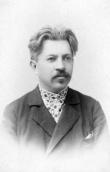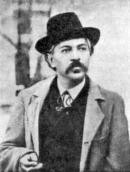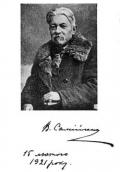Volodymyr Samijlenko
Volodymyr Ivanovich Samijlenko (January 22 (February 4) 1864 – August 12, 1925) – Ukrainian poet.
V. S. was born in the town (now – Myrhorod District, Poltava Region). His father was the landowner Ivan Lysevych, who seduced his young servant Oleksandra Samijlenko, but did not recognize the child as his own.
Fortunately, V. S. found good guardians, thanks to whom he graduated from elementary school in Myrhorod, and then in 1875-1884 he studied at the Poltava Gymnasium.
In 1884-1890 V.S. studied at the History and Philology Faculty of Kyiv University, but he did not want to take the final exams and did not receive a diploma. During his studies, V. S. met many Ukrainians from Kyiv, including Ivan Franko (when the latter came to Kyiv in 1886). In the summer of 1887, he visited Galicia, where he met Ukrainian figures from Galicia.
After leaving the university, V. S. worked for two years at the telegraph in Kyiv, where he earned very little. In 1893 – 1900, he worked in Chernihiv as the secretary of the "Zemsky Sbornik Chernihiv Province". In Chernihiv, he met Olga Stepanivna Orishko and married her (1896).
taken from the funds of the Vernadsky National Library of Ukraine. It is not dated, but we would like to believe that it was made in Kyiv in the 1890s, perhaps at the beginning of them, at the time when V. S. was involved in the work of Pleiades.
taken from Wikipedia. It was made in 1902 in Katerynodar.
published in Borys Lysyansky’s brochure "Volodymyr Samijlenko" (Tarniv: 1921). It was made in Tarniv on February 15, 1921, with the autograph of V.S.
Later, in 1900, V. S. moved to Katerynodar in the Kuban, and in 1903 to Myrhorod in the Poltava region, where he held minor official positions.
In 1905, when the political regime in the Russian Empire was somewhat liberalized as a result of revolutionary movements, V. S. moved to Kyiv in the hope that he would be engaged in his favorite literary work and be able to earn a living by publishing in the newly born Ukrainian press. But with the strengthening of the reaction, the police persecution of this press also increased, and the opportunities to publish satirical essays on modern political life, which V. S. skillfully wrote, were rapidly decreasing.
In 1907 V. S. passed the notary exam and until 1917 worked as a notary in the town of Dobryanka near Chernigov.
With the outbreak of the revolution in 1917, V. S. moved to Kyiv, but could not find a better place for himself as an official in the government of the Ukrainian People’s Republic. Together with this government, in 1919 he moved to Kamianets-Podilsky, and then at the end of 1920 – to Tarnow in modern Poland. The government assigned him a pension, but could pay it very hardly.
In 1924, V. S. managed to return to Kyiv, where he again applied for a pension, but even here there were difficulties. The death of both of his adult daughters in 1924 was a heavy blow for Samijlenko (two of his sons died as infants in Chernihiv). In August 1925, V. S. died in Boyarka, at the age of only 61. In general, the biography of Volodymyr Samijlenko is typical for a Ukrainian intellectual who was able to engage in creativity only in his free time from working.
V. Samijlenko’s literary work began in gymnasium, in 1884. These were verse translations and lyrical poems. Studying at the university, getting to know Ukrainian writers from Kyiv and Galicia, participating in the "Pleiada" group, in which young Kyiv poets took part – all this contributed to the rapid growth and development of Samijlenko’s poetic gift, who already in those years showed himself to be an excellent satirist. At that time, his works were published mainly in Ukrainian magazines in Galicia.
In Chernihiv, V. S. continued to create new lyrical and satirical poems, also at this time he became interested in drama and wrote 5 plays, which, however, did not arouse great interest of theater actors. In Katerynodar, he took advantage of the opportunity and printed in the local press several satirical poems in Russian, which Samijlenko wrote very rarely and always in connection with specific opportunities to print such works.
In the short period of 1905-1906, V. S. took advantage of the opportunity to publish and gave a whole series of poetic and prose satires on current political topics, a kind of diary of hopes and disappointments related to reforms in the Russian Empire.
Disappointment from the meager "reforms" and even more from the defeat of the Ukrainian liberation struggle caused a decline in V. Samijlenko’s creative activity after 1907. At this time, he returned to translation work, to which he paid attention in the 1880s and 1890s. The legacy of Samijlenko-translator is still waiting to be collected and fully republished.
Samijlenko’s best lyric poems certainly occupy a permanent place in the pantheon of Ukrainian poetry, and some of his satires sound relevant even in our time.
M. Zh., March 9, 2024.



